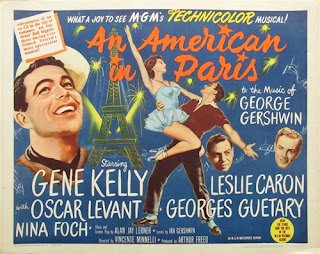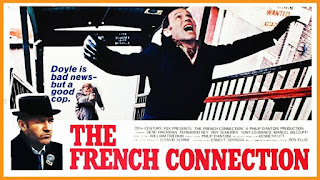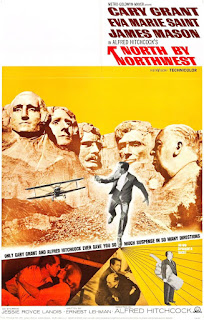by Lani
Each month, I scour the Turner Classic Movies schedule for upcoming films that I can't miss. The highlights are posted here for your reading and viewing pleasure! (All listed times are Eastern Standard, check your local listings or TCM.com for actual air times in your area. Each day's schedule begins at 6:00 a.m.; if a film airs between midnight and 6 a.m. it is listed on the previous day's programming schedule.)
It's award season in Hollywood, which means it's time for TCM's "31 Days of Oscar" programming. Each day in February (and a few in March, too) will feature films which were Academy Award winners or nominees. This year, the films are being shown from A to Z starting with Abe Lincoln in Illinois on February 1 and ending with, well, Z on March 3. The alphabetical order creates some interesting programming blocks of films you might never see on a double feature except during 31 Days of Oscar. I've chosen a few of my favorite groupings this month.
2/1: A is for archetype
8 PM - All About Eve (1950)
10:30 PM - An American in Paris (1951)
12:30 AM - Annie Hall (1977)
What better way to start the month than with the film which holds the record for most Oscar nominations, All About Eve? It's 14 nominations have since been tied by Titanic and this year's awards frontrunner La La Land; however, there were fewer categories in the 50s, so All About Eve's record is even more impressive. The film won 5 awards: Best Picture, Best Director, Best Screenplay, Best Costume Design, and Best Supporting Actor for George Sanders. In his autobiography Sanders said of winning an Oscar, "I was grateful and flattered to get mine, but apart from making my already large ego one size larger it did absolutely nothing for me." The film's star, Bette Davis, might disagree. Davis and co-star Anne Baxter were both nominated for Best Actress, the first time two lead actresses had been nominated for the same film; however, the award that year went to Judy Holliday for Born Yesterday. The film is the ultimate backstage story, centering on an established stage actress threatened by an ambitious younger woman with her sights set on stardom. Davis's powerful performance as Broadway star Margo Channing and Baxter's equally good turn as the cunning upstart Eve Harrington, plus the bitingly witty dialog by writer /director Joseph Mankiewicz, make this one of the best of all time.
Though musicals had been popular since silent films became talkies, it was rare for a musical to win best picture. An American in Paris broke the trend garnering 8 nominations and 6 wins, including Best Picture. Gene Kelly stars as an American painter living in Paris who has a complicated romance with a French girl. The charming performances of the cast, particularly Kelly and love interest Leslie Caron, beautiful dances choreographed by Kelly, and the iconic music of the Gershwins, make An American in Paris a true delight. One of the most memorable sequences is the 17-minute "dream ballet" which ends the film. The power of this sequence must have stuck in the minds of the Academy voters because while director Vincente Minelli lost out to the director of A Place in the Sun, George Stevens; Gene Kelly was given an honorary award "in appreciation of his versatility as an actor, singer, director and dancer, and specifically for his brilliant achievements in the art of choreography on film." I would give credit to both Minelli and Kelly for the creative vision which made this film one of the crowning achievements of MGM's golden age.
Annie Hall received 4 Academy Awards for Best Picture, Woody Allen's direction, the screenplay by Allen and Marshall Brickman, and Best Actress for Diane Keaton. The only nominated category it didn't win that year was Best Actor, in which Allen lost to Richard Dreyfuss for his performance in The Goodbye Girl. Comedy is another genre which is not often recognized by Oscar. Annie Hall was the first comedy since 1963's Tom Jones to win Best Picture (beating out Star Wars along the way); and I'm not sure there's been another since then...maybe Shakespeare in Love? The story is a simple one in which boy, comedy writer Alvy, meets girl, aspiring singer Annie, but the two quickly complicate matters with their neuroses and insecurities. With this film, Allen created the blueprint for modern romantic comedy.
2/8: F is for force
12 AM - The French Connection (1971)
2 AM - Friendly Persuasion (1956)
The French Connection was the big winner of 1971, with 8 nominations and 5 wins, including Best Picture. The film, which follows two Brooklyn narcotics detectives tracking a drug kingpin, is memorable for a breathless car chase sequence and Gene Hackman's forceful portrayal of brutish cop Jimmy "Popeye" Doyle. No surprise then that the film picked up Oscars for Best Editing and Best Actor, in addition to awards for its director, William Friedkin, and screenplay by Ernest Tidyman.
Friendly Persuasion proves that you can also make an impact through the rejection of violence, a sentiment echoed by this year's Oscar nominated film Hacksaw Ridge (ironically, an extremely violent film). The story centers on a Quaker family in Indiana whose commitment to peace is tested during the Civil War. The film received 6 nominations for Best Picture, Screenplay, Sound, and Director, as well as for the featured song "Friendly Persuasion (Thee I Love)" and supporting actor Anthony Perkins. Though set against the tumult of the Civil War, this is also a sentimental film about a family kept together by their strength of will and faith. But despite box office popularity, able direction by William Wyler, and strong performances by Gary Cooper and Dorothy McGuire, Friendly Persuasion lost the big prize that year to the star-studded spectacle of Around the World in 80 Days filmed in ultra wide screen Todd-AO.
2/11: H is for hysteria
10 PM - A Hard Day's Night (1964)
11:45 PM - Harvey (1950)
Put together quickly to capitalize on worldwide Beatlemania, A Hard Day's Night is much better than it has any right to be and ending up getting two Academy Award nominations. The filmmakers were secretly worried that the Beatles could be a passing fad; therefore, the film needed to get to theaters quickly. The filming was completed in six weeks and the finished product premiered only three months after filming began! The hilarious, and Oscar-nominated, screenplay by Alun Owen focuses on a day (or so) in the life of the band as they talk to the press, evade hordes of screaming fans, and generally goof around, all in the lead-up to a performance on a television show. The screenplay is further helped by the innate charm of John, Paul, George, and Ringo, as well as a crack supporting cast of British character actors, most notably William Brambell as Paul's crotchety, mischievous grandfather. Of course another big reason to watch the film is the music, including the title song and other hits like "Can't Buy Me Love" and "All My Loving." Producer George Martin received the film's second Oscar nomination for the score. (Note: the category of "musical score - adaptation or treatment" was only around from 1963 to 1968, and most nominees were films which had been adapted from Broadway musicals with existing scores.)
Harvey received two Oscar nominations, Best Actor for star James Stewart and Best Supporting Actress for Josephine Hull (which she won). However, it's a shock to me that the screenplay, adapted for film by Mary Chase and Oscar Brodney from Chase's Pulitzer Prize winning play, was completely overlooked. The concept -- that a small-town eccentric (or drunk, depending on your opinion) is accompanied everywhere by a 6'3" invisible rabbit to the embarrassment and dismay of his family -- is so out there, it takes a masterful touch to make it work. Stewart gives one of his most memorable comedic performances as the gentle iconoclast Elwood P. Dowd, though he lost the Oscar to Jose Ferrer's starring performance in Cyrano de Bergerac. The play had been a hit on Broadway for five years and the filmmakers imported most of the original cast, including Hull as Dowd's increasingly desperate sister. A couple of interesting facts about the film -- though it is implied that Elwood is an alcoholic, due to the film production code he is never shown taking a drink; many of the shots in the film are intentionally wider than they need to be to allow room for the invisible Harvey.
2/19: N is for nominee
6:30 AM - North by Northwest (1959)
9 AM - Now, Voyager (1942)
11 AM - The Nun's Story (1959)
They say it's an honor just to be nominated. Sometimes a really great film can pick up a few nominations, but in the end lose to that year's juggernaut. That's what happened to Alfred Hitchcock's spy thriller North by Northwest, which picked up 3 nominations for Art Direction, Editing, and Screenplay; unfortunately for Hitch, his film was up against Ben-Hur which would set a record that year with 11 wins. (The record still stands, but is shared with Titanic and Lord of the Rings: Return of the King.) The original screenplay award that year would go to the Doris Day-Rock Hudson comedy Pillow Talk. Combining many of Hitchcock's signature elements -- mistaken identity, a glamorous blonde, diabolical villains, and fear of those people and institutions we should trust -- plus favorite leading man Cary Grant, North by Northwest is the quintessential Hitchcock picture. The famous crop duster scene is so well done, it is suspenseful no matter how many times I watch it. However, one of the best parts of the movie didn't even get a nomination: Bernard Hermann's memorable score.
Also coming up empty at the 1959 Oscars was The Nun's Story, directed by Fred Zinnemann and starring Audrey Hepburn. This moving portrait of a nun who must repress her natural independence first as a novice, and later on a mission to Africa, was one of the most popular movies of the year. The strength of the film lies in the star power of Hepburn, and she gives a superb performance as Gaby/Sister Luke; playing against her fashion-plate image, she spends most of the film covered up in a nun's habit. Hepburn was nominated for Best Actress, but lost to Simone Signoret, the polar opposite of a nun as an unfaithful wife in Room at the Top. The film received 8 nominations in all, including Best Picture, Director, Cinematography, Editing, Sound, Score, and Adapted Screenplay. I'll admit that the film might sound dull at first, but The Nun's Story is so well-crafted it will pull you in and keep you captivated.
Now, Voyager is an emotional drama about a plain, put-upon woman who comes into her own through the help of a psychiatrist and her chaste love for a married man. It was Bette Davis's biggest hit of the 1940s and provided many quotable lines, including "Don't ask for the moon, we have the stars." The brilliant Bette Davis was again nominated for Best Actress, but did not win. (Lest you're feeling sorry for her now, she had already won the award twice in the 1930s for her performances in Dangerous and Jezebel.) Gladys Cooper, who played Davis's domineering mother, received a Best Supporting Actress nomination. Both the Best Actress and Supporting Actress Oscar would go to the stars of that year's big winner Mrs. Miniver, Greer Garson and Teresa Wright, respectively. However, Now, Voyager did manage one win for the elegant score by Max Steiner.
2/22: R is for romance
8 PM - Roman Holiday (1953)
10:15 PM - A Room with a View (1986)
Roman Holiday is an effervescent romp through the streets of Rome which made Audrey Hepburn a star. She plays a princess on an official tour of Europe, who runs away from her duties and has an adventure with an American reporter (played by Gregory Peck). The film received 10 Oscar nominations, including Best Picture, Director, Cinematography, Editing, Art Direction, Screenplay, and Supporting Actor for Eddie Albert. It won in three categories: Best Actress, Costumes, and Motion Picture Story. It is interesting to note that, at the time, "motion picture story" was a separate category from screenplay; so, Dalton Trumbo's original story (perhaps inspired by England's rebellious Princess Margaret) won the Oscar, but the completed screenplay did not. Hepburn's chic, modern clothes and gamine haircut were copied by women around the world, which probably helped costume designer Edith Head grab the win over other films with more elaborate costumes.
It's back to Italy with A Room with View, a delightful period comedy about a young Englishwoman torn between her straitlaced fiance and an impetuous Bohemian she meets in Florence. The film received 8 Oscar nominations, tying that year's ultimate Best Picture winner Platoon. It won in three categories: Adapted Screenplay, Art Direction, and Costume Design. A Room with a View was the first worldwide hit for producer Ismail Merchant, director James Ivory, and writer Ruth Prawer-Jhabavala, who adapted the story from the E.M. Forster novel. If you think "Merchant-Ivory film" means a stuffy costume drama, this film may surprise you. It pokes fun at the buttoned-up aspects of Edwardian culture, but never dips into farce; while the romance is handled with deft delicacy.




1 comment:
As always, you have captured the essence of these classics!
Post a Comment